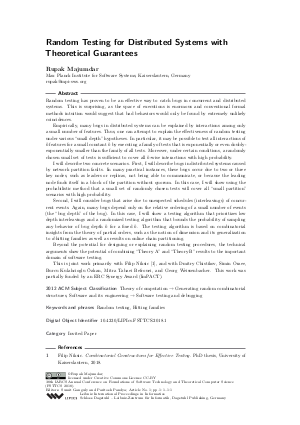Random Testing for Distributed Systems with Theoretical Guarantees (Invited Paper)
Author Rupak Majumdar
-
Part of:
Volume:
38th IARCS Annual Conference on Foundations of Software Technology and Theoretical Computer Science (FSTTCS 2018)
Part of: Series: Leibniz International Proceedings in Informatics (LIPIcs)
Part of: Conference: IARCS Annual Conference on Foundations of Software Technology and Theoretical Computer Science (FSTTCS) - License:
 Creative Commons Attribution 3.0 Unported license
Creative Commons Attribution 3.0 Unported license
- Publication Date: 2018-12-05
File

PDF
LIPIcs.FSTTCS.2018.1.pdf
- Filesize: 181 kB
- 1 pages
Document Identifiers
Subject Classification
ACM Subject Classification
- Theory of computation → Generating random combinatorial structures
- Software and its engineering → Software testing and debugging
Keywords
- Random testing
- Hitting families
Metrics
- Access Statistics
-
Total Accesses (updated on a weekly basis)
0Document
0Metadata
Abstract
Random testing has proven to be an effective way to catch bugs in concurrent and distributed systems. This is surprising, as the space of executions is enormous and conventional formal methods intuition would suggest that bad behaviors would only be found by extremely unlikely coincidences. Empirically, many bugs in distributed systems can be explained by interactions among only a small number of features. Thus, one can attempt to explain the effectiveness of random testing under various "small depth" hypotheses. In particular, it may be possible to test all interactions of k features for a small constant k by executing a family of tests that is exponentially or even doubly-exponentially smaller than the family of all tests. Moreover, under certain conditions, a randomly chosen small set of tests is sufficient to cover all k-wise interactions with high probability. I will describe two concrete scenarios. First, I will describe bugs in distributed systems caused by network partition faults. In many practical instances, these bugs occur due to two or three key nodes, such as leaders or replicas, not being able to communicate, or because the leading node finds itself in a block of the partition without quorum. In this case, I will show using the probabilistic method that a small set of randomly chosen tests will cover all "small partition" scenarios with high probability. Second, I will consider bugs that arise due to unexpected schedules (interleavings) of concurrent events. Again, many bugs depend only on the relative ordering of a small number of events (the "bug depth" of the bug). In this case, I will show a testing algorithm that prioritizes low depth interleavings and a randomized testing algorithm that bounds the probability of sampling any behavior of bug depth k for a fixed k. The testing algorithm is based on combinatorial insights from the theory of partial orders, such as the notion of dimension and its generalization to d-hitting families as well as results on online chain partitioning. Beyond the potential for designing or explaining random testing procedures, the technical arguments show the potential of combining "Theory A" and "Theory B" results to the important domain of software testing. This is joint work primarily with Filip Niksic [Filip Niksic, 2018], and with Dmitry Chistikov, Simin Oraee, Burcu Kulahcioglu Özkan, Mitra Tabaei Befrouei, and Georg Weissenbacher. This work was partially funded by an ERC Synergy Award (ImPACT).
Cite As Get BibTex
Rupak Majumdar. Random Testing for Distributed Systems with Theoretical Guarantees (Invited Paper). In 38th IARCS Annual Conference on Foundations of Software Technology and Theoretical Computer Science (FSTTCS 2018). Leibniz International Proceedings in Informatics (LIPIcs), Volume 122, p. 1:1, Schloss Dagstuhl – Leibniz-Zentrum für Informatik (2018)
https://doi.org/10.4230/LIPIcs.FSTTCS.2018.1
BibTex
@InProceedings{majumdar:LIPIcs.FSTTCS.2018.1,
author = {Majumdar, Rupak},
title = {{Random Testing for Distributed Systems with Theoretical Guarantees}},
booktitle = {38th IARCS Annual Conference on Foundations of Software Technology and Theoretical Computer Science (FSTTCS 2018)},
pages = {1:1--1:1},
series = {Leibniz International Proceedings in Informatics (LIPIcs)},
ISBN = {978-3-95977-093-4},
ISSN = {1868-8969},
year = {2018},
volume = {122},
editor = {Ganguly, Sumit and Pandya, Paritosh},
publisher = {Schloss Dagstuhl -- Leibniz-Zentrum f{\"u}r Informatik},
address = {Dagstuhl, Germany},
URL = {https://drops.dagstuhl.de/entities/document/10.4230/LIPIcs.FSTTCS.2018.1},
URN = {urn:nbn:de:0030-drops-99000},
doi = {10.4230/LIPIcs.FSTTCS.2018.1},
annote = {Keywords: Random testing, Hitting families}
}

